Hiring the right Quality Assurance (QA) Engineer can make or break your software development process. Many companies underestimate the importance of this role, often treating it as an afterthought. However, a skilled QA Engineer is key to ensuring product quality, reducing bugs, and improving user satisfaction. The challenge lies in identifying candidates who not only have technical skills but also possess the right mindset for quality assurance.
This comprehensive guide will walk you through the process of hiring top-notch QA Engineers. We'll cover everything from understanding the role to conducting effective interviews. To get started, you might want to check out our QA Engineer Test to assess potential candidates.
Table of contents
What Does a Quality Assurance Engineer Do?
A Quality Assurance (QA) Engineer plays a key role in ensuring software products meet high standards of quality and functionality. They work closely with development teams to identify and resolve issues, aiming to deliver a seamless user experience.
The day-to-day responsibilities of a QA Engineer include:
- Designing and implementing test plans, scenarios, and cases
- Conducting various types of testing, including manual and automated testing
- Documenting and tracking software defects
- Collaborating with developers to address and fix issues
- Analyzing test results and providing feedback to improve product quality
- Staying updated on industry best practices and testing methodologies
Quality Assurance Engineer Hiring Process
Hiring a Quality Assurance Engineer typically takes around 1-2 months. Here's a streamlined view of the process you'll follow.
- Define the Role: Start by crafting a clear and detailed job description for the Quality Assurance Engineer position. This will set the foundation for your recruitment.
- Post the Job: Share the job listing on relevant job boards and platforms. Expect to receive applications within the first week.
- Screen Resumes: Review the submitted resumes and shortlist candidates based on required skills and experience. This step usually takes about a week.
- Skill Assessment: Conduct skill testing to evaluate candidates' technical abilities. You can use assessments tailored for QA roles, which might take another week.
- Interviews: Schedule interviews with the shortlisted candidates. Prepare to assess both technical and behavioral aspects.
- Final Selection: Once interviews are completed, choose the best-fit candidate and move to the offer stage.
Overall, the process encompasses defining the role, screening, testing, and interviewing. You should anticipate candidates with diverse backgrounds. We'll now expand on each step, providing checklists and resources to streamline your hiring journey.
Skills and Qualifications to Look for in a Quality Assurance Engineer
When hiring a Quality Assurance Engineer, creating the right candidate profile can be tricky. The challenge lies in distinguishing between what is required for the role versus what is preferred. It's essential to make this distinction to avoid missing out on candidates who meet your core needs but may not tick every box on your wishlist.
Required skills often include a strong foundation in software QA methodologies and hands-on experience with both manual and automated testing techniques. On the other hand, preferred qualifications might encompass certifications like ISTQB or familiarity with Agile/Scrum methodologies. For deeper insights into mapping skills to specific roles, you can explore our skill mapping resource.
| Required skills and qualifications | Preferred skills and qualifications |
|---|---|
| Bachelor's degree in Computer Science, Engineering, or related field | Certification in software testing (e.g., ISTQB) |
| 3+ years of experience in software quality assurance or testing | Experience with performance testing and security testing |
| Strong knowledge of software QA methodologies, tools, and processes | Knowledge of Agile/Scrum methodologies |
| Proficiency in test case design, execution, and defect tracking | Familiarity with continuous integration and deployment (CI/CD) practices |
| Experience with both manual and automated testing techniques | Experience in API testing and web services testing |
How to Write an Effective Quality Assurance Engineer Job Description
Creating a compelling job description is key to attracting top-notch Quality Assurance Engineers. Here are some quick tips to help you craft a standout posting:
• Clearly outline the role's responsibilities and impact: Detail specific tasks like developing test plans, executing automated tests, and collaborating with developers. Highlight how the QA Engineer's work will improve product quality and user satisfaction.
• Balance technical requirements with soft skills: While listing technical skills like proficiency in testing tools and programming languages, don't forget to emphasize soft skills such as attention to detail, problem-solving, and teamwork. A well-rounded Quality Assurance Engineer can contribute more effectively to your team.
• Showcase your company's unique selling points: Highlight what makes your organization special, such as innovative projects, growth opportunities, or a supportive work environment. This helps attract candidates who align with your company culture and values.
Top Platforms to Hire Quality Assurance Engineers
Now that you have your job description ready, the next step is to list your position on job listing sites to source the right candidates. Here are some of the best platforms to help you find Quality Assurance Engineers who fit your company's needs.
LinkedIn Jobs
LinkedIn is ideal for finding full-time QA Engineers with professional profiles and connections.

Indeed
A popular job board for listing full-time positions, offering a wide range of candidates.

Upwork
Best for hiring freelance QA engineers for short-term or project-based work.

In addition to the top three platforms mentioned, there are several other excellent options for hiring Quality Assurance Engineers. Glassdoor offers insights into company cultures, which can help attract quality candidates, while Dice focuses specifically on tech roles, making it easier to find skilled engineers. For startups, AngelList is ideal, and for those looking for freelance QA talent, Upwork and Guru provide ample opportunities.
Keywords to Look for in Quality Assurance Engineer Resumes
Screening resumes is the first step in narrowing down candidates for a Quality Assurance Engineer position. With the sheer volume of applications, it's impossible to interview every candidate. Effective resume screening helps you shortlist the candidates that align with your needs.
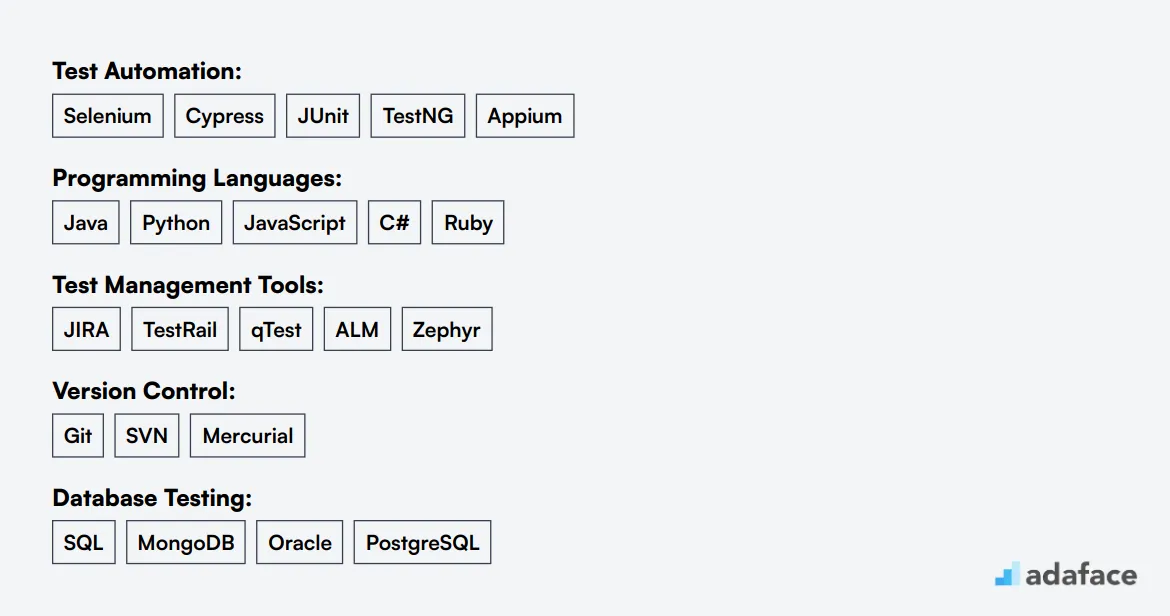
To manually screen resumes, you should have a clear idea of the primary and secondary keywords relevant to a QA Engineer role. Look for key skills like test case design, manual and automated testing techniques, and familiarity with QA methodologies. Highlight candidates with experience in tools like Selenium, JIRA, and SQL.
Alternatively, you can use AI tools like ChatGPT for resume screening. By inputting your specific keyword requirements, AI can quickly sieve through resumes, identifying those that best match your criteria. This method saves time and ensures you don't overlook capable candidates.
Here’s a sample prompt to use with AI for resume screening:
TASK: Screen resumes to match job description for Quality Assurance Engineer role
INPUT: Resumes
OUTPUT: For each resume, provide the following information:
- Email ID
- Name
- Matching keywords
- Score (out of 10 based on keywords matched)
- Recommendation (detailed recommendation of whether to shortlist this candidate or not)
- Shortlist (Yes, No, or Maybe)
RULES:
- If unsure, put candidate as Maybe instead of No
- Keep recommendations concise.
KEYWORDS DATA:
- QA Methodologies and Tools: Selenium, JIRA, SQL
- Testing Techniques: Manual, Automated
- Programming Languages: Java, Python
Check out more on how to conduct an interview.
Top Skills Tests to Assess Quality Assurance Engineers
Skills tests are a great way to evaluate QA Engineers beyond their resumes. They provide objective data on a candidate's abilities and help you make informed hiring decisions. Here are the key tests we recommend for assessing QA Engineers:
QA Engineer Test: This comprehensive assessment covers core QA concepts, testing methodologies, and practical problem-solving skills. It's an excellent starting point to gauge a candidate's overall QA knowledge.
Manual Testing Online Test: Use this test to evaluate a candidate's ability to create test cases, identify bugs, and understand testing principles. It's particularly useful for roles that require strong manual testing skills.
Selenium Online Test: For QA roles involving automation, the Selenium test is invaluable. It assesses a candidate's proficiency in using Selenium for web application testing and automation scripting.
Attention to Detail Test: QA Engineers need sharp eyes to catch even minor issues. This test helps you identify candidates with strong observational skills and meticulousness.
Problem Solving Test: QA work often involves troubleshooting and analytical thinking. A problem-solving assessment can reveal a candidate's ability to approach complex issues logically and find effective solutions.
Structuring the Interview Stage for Quality Assurance Engineers
After candidates successfully navigate through the initial skills tests, it's crucial to transition them to technical interviews to further assess their hard skills. Skills tests help filter out those who aren't suitable, but they might not highlight those best fit for the role. Technical interviews allow for a deeper evaluation, enabling you to determine the candidate's proficiency in essential QA concepts and tools.
Consider asking the following interview questions: What approaches do you use for manual testing? This explores their understanding of testing methods. Can you explain the difference between verification and validation in QA? This checks their grasp on quality concepts. How do you handle automation testing challenges? This gauges their problem-solving abilities. What is your experience with various testing tools, and which is your favorite? Understanding their tool preference can reveal their expertise. Describe a difficult testing issue you encountered and how you resolved it. This showcases their critical thinking and adaptability. These questions help you find candidates who not only know QA but also have the practical skills to thrive in your organization.
How Much Does It Cost to Hire a Quality Assurance Engineer?
The cost of hiring a Quality Assurance Engineer varies widely based on location and experience. In the United States, the average annual salary is around $96,360, with a range from $58,302 to $141,341. High-tech hubs like San Francisco can see even higher salaries, reaching up to $124,513 per year.
Globally, salaries differ significantly. In India, the annual pay ranges from ₹316,920 to ₹1,417,931, while in Australia, it averages around $100,986 AUD. Canada offers an average of $79,965 CAD annually.
Quality Assurance Engineer Salary in the United States
The average salary for a Quality Assurance Engineer in the United States is approximately $96,360 annually. Salaries can vary significantly by location, with the lowest reported salary around $58,302 and the highest reaching $141,341. For instance, in places like San Francisco, CA, the average can go up to $124,513, reflecting the higher cost of living in that area.
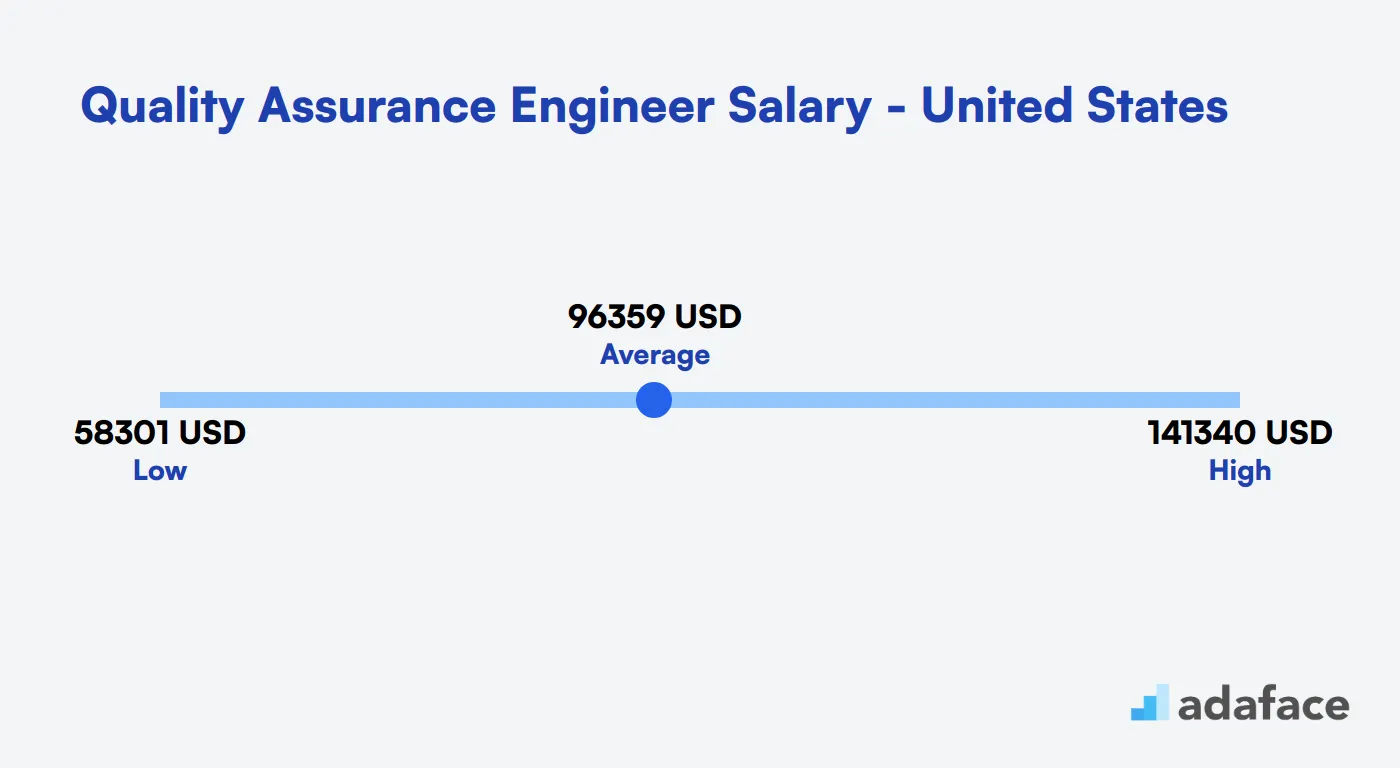
Quality Assurance Engineer Salary in Australia
The average salary for a Quality Assurance Engineer in Australia is approximately $100,986 AUD. Salaries can vary significantly depending on the location, with figures ranging from $72,404 AUD to $133,119 AUD. Major cities like Melbourne and Sydney offer competitive salaries, with averages around $106,572 AUD and $101,291 AUD, respectively.
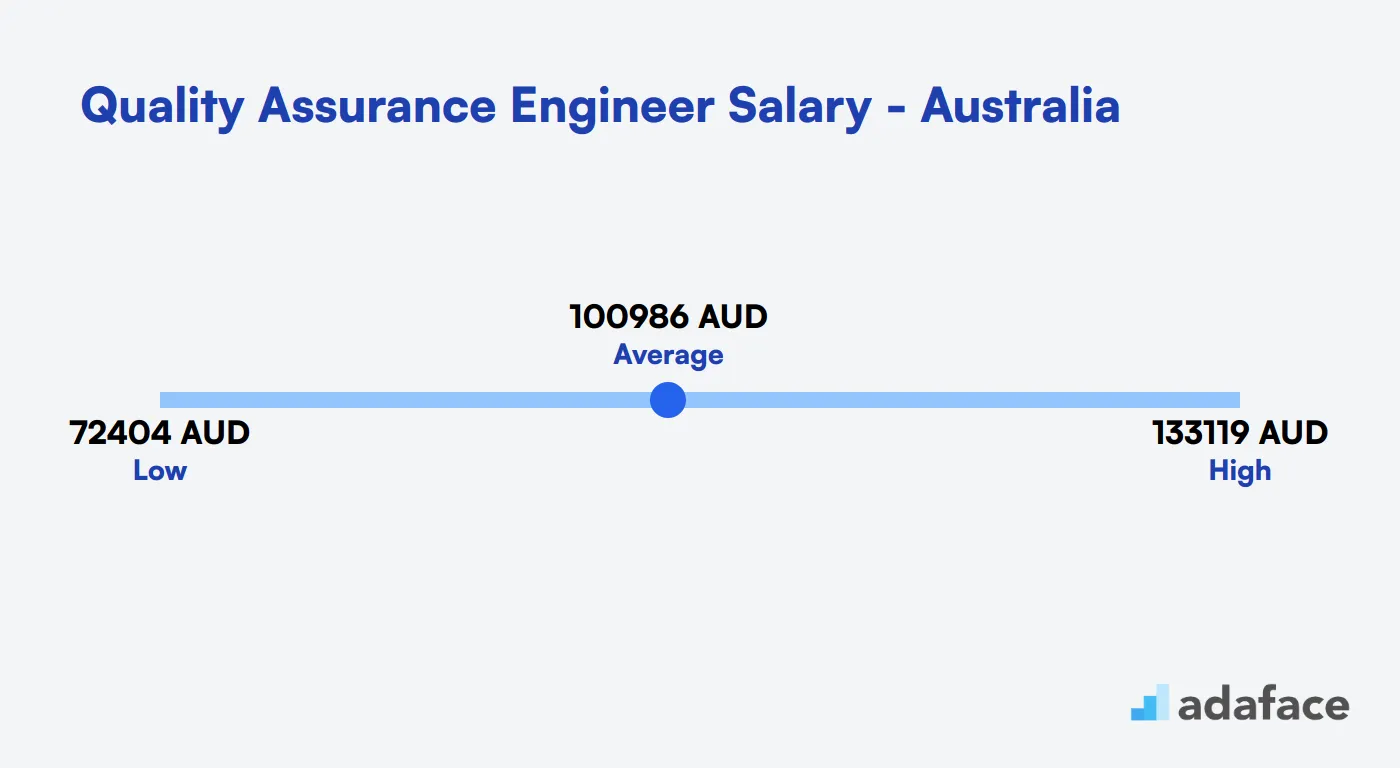
Quality Assurance Engineer Salary in Canada
The average salary for a Quality Assurance Engineer in Canada is approximately $79,965 CAD. Salaries can range from a low of about $53,790 CAD to a high of around $109,973 CAD. Major cities, such as Ottawa and Calgary, tend to offer competitive salaries that reflect the local demand for QA professionals.
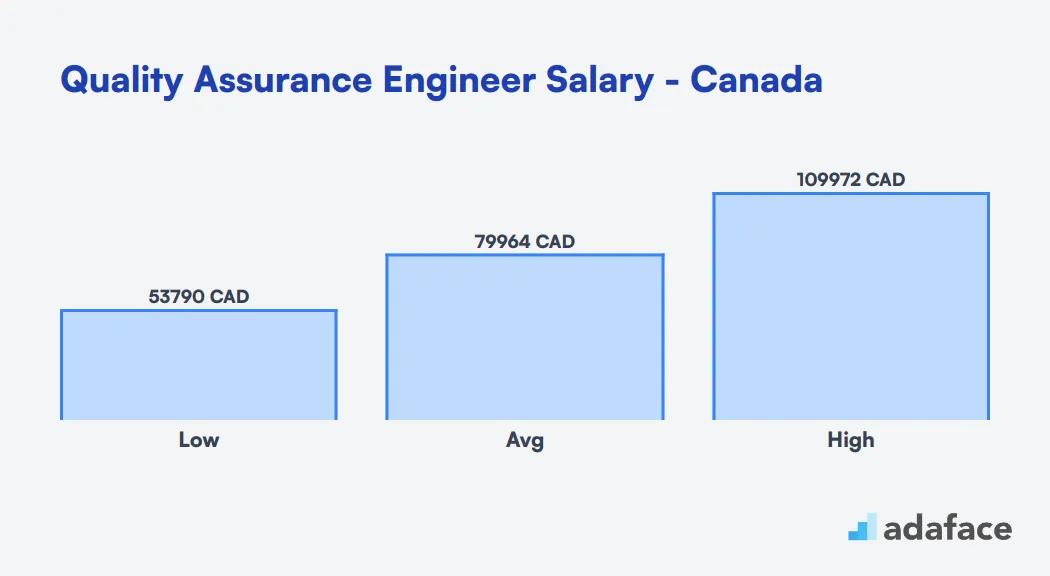
Quality Assurance Engineer Salary in India
In India, the average salary for Quality Assurance Engineers ranges from ₹316,920 to ₹1,417,931 per year. The median salary stands at ₹670,351, while the mean is ₹795,253.
Salaries vary significantly across cities. Mumbai offers the highest median at ₹1,057,914, followed by Gurgaon at ₹1,019,468. Bengaluru and Hyderabad, known for their tech hubs, offer median salaries of ₹800,208 and ₹828,593 respectively.
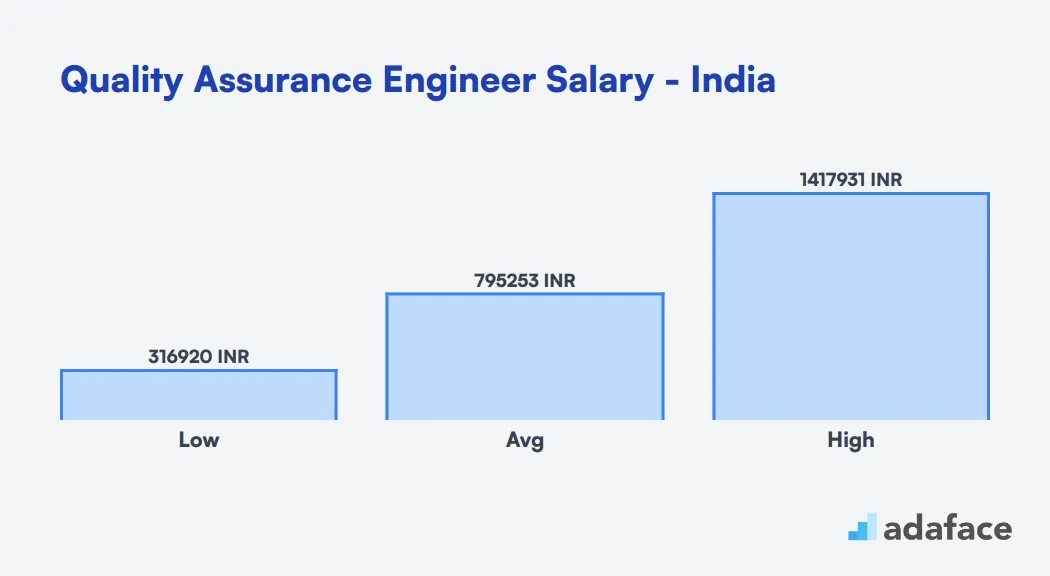
What are the ranks of Quality Assurance Engineers?
Quality Assurance (QA) Engineers play a critical role in ensuring software quality, but their ranks can sometimes be confusing. Let's break down the typical hierarchy of QA positions to help you understand the career progression in this field.
- Junior QA Engineer: This is an entry-level position for those new to the field. Junior QA Engineers typically perform basic testing tasks, learn testing methodologies, and assist senior team members.
- QA Engineer: At this level, professionals have gained experience and can independently handle various testing tasks. They're proficient in multiple testing techniques and may specialize in certain areas like automation testing.
- Senior QA Engineer: These experienced professionals lead testing efforts for complex projects. They mentor junior team members, contribute to test strategy development, and often collaborate with other departments.
- QA Lead: QA Leads manage small to medium-sized QA teams. They oversee test planning, resource allocation, and ensure quality standards are met across projects.
- QA Manager: At this level, professionals are responsible for larger QA departments. They develop testing strategies, manage budgets, and align QA efforts with overall business goals.
- Director of Quality Assurance: This top-level position involves setting company-wide quality standards, managing multiple QA teams, and working closely with other executive leaders to drive quality initiatives across the organization.
Hire the Right Quality Assurance Engineers for Your Needs
In this blog post, we've explored the key aspects of hiring Quality Assurance Engineers, from understanding their responsibilities to identifying the necessary skills and qualifications. We've covered how to craft effective job descriptions, choose the right platforms for recruitment, and use interview techniques to find the right fit.
If there's one takeaway from this guide, it's the importance of using precise job descriptions and skills tests to make informed hiring decisions. Tests like the QA Engineer Test can help you assess candidates effectively and ensure they have the right capabilities for your team.
QA Engineer Test
FAQs
Key skills for a QA Engineer include strong analytical abilities, attention to detail, knowledge of testing methodologies, proficiency in test automation tools, excellent communication skills, and a deep understanding of the software development lifecycle.
You can assess technical skills through coding tests, problem-solving exercises, and specific QA-related scenarios. Using platforms like Adaface's QA Engineer Test can provide a comprehensive evaluation of a candidate's abilities.
A good job description should outline responsibilities such as developing test plans, executing manual and automated tests, reporting bugs, and collaborating with developers. It should also specify required technical skills, education, and any industry-specific experience needed.
While experience with specific tools can be beneficial, it's more important to hire candidates who demonstrate adaptability and a willingness to learn. Focus on their understanding of testing principles and ability to pick up new technologies quickly.
Effective interview questions might include asking about their approach to test planning, experience with different types of testing (e.g., functional, performance, security), how they handle conflicts with developers, and examples of how they've improved testing processes in previous roles.
You can evaluate problem-solving skills by presenting candidates with real-world testing scenarios or bugs and asking them to walk through their approach. Additionally, problem-solving tests can provide insights into their analytical abilities.
Soft skills are crucial for QA Engineers. Look for candidates with excellent communication skills, teamwork abilities, patience, and a detail-oriented nature. These skills are essential for effectively collaborating with developers, clearly reporting issues, and maintaining a quality-focused mindset.

40 min skill tests.
No trick questions.
Accurate shortlisting.
We make it easy for you to find the best candidates in your pipeline with a 40 min skills test.
Try for freeRelated posts
Free resources



